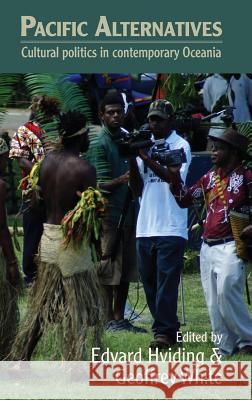Pacific Alternatives: Cultural Politics in Contemporary Oceania » książka
Pacific Alternatives: Cultural Politics in Contemporary Oceania
ISBN-13: 9781907774386 / Angielski / Twarda / 2015 / 296 str.
At the centre of this collection are the actors and processes referred to by the distinguished Oceania thinker and visionary Epeli Hau'ofa as 'ordinary people ... who, because of the poor flows of benefits from the top, scepticism about stated policies and the like, tend to plan and make decisions about their lives independently, sometimes with surprising and dramatic results that go unnoticed or ignored at the top'. The contributors explore innovative social, cultural and political responses to global processes as they influence and unfold in a range of Pacific locations - with a major focus on Island Melanesia and a further range of contributions on Palau, Pohnpei, Rotuma and Australia. A multidisciplinary group, including a number of Pacific Islanders, the authors present contemporary connections between expanding perceptions of cultural heritage and the emergence of new political forms, in the context of challenges posed by the global political economy. At issue in the volume are viable local Pacific alternatives to the institutions and practices commonly advocated in development discourse, but difficult to implement in Pacific settings. Pacific Alternatives provides fresh perspectives on the ways that cultural heritage serves as a unique source of engaging the modern state and global non-state actors. The volume showcases two of the strongest features of contemporary Pacific Studies scholarship: the ability to find new insights in experience-near analyses of Islander life that have world-enlarging potentials, and the foregrounding of Indigenous voices in the evolving dialogue around land, politics, culture, tradition, custom, and identity. Ty K wika Tengan - Professor of Anthropology & Chair of the Dept. of Ethnic Studies, University of Hawai'i"
At the centre of this collection are the actors and processes referred to by the distinguished Oceania thinker and visionary Epeli Hauofa as ordinary people ... who, because of the poor flows of benefits from the top, scepticism about stated policies and the like, tend to plan and make decisions about their lives independently, sometimes with surprising and dramatic results that go unnoticed or ignored at the top. The contributors explore innovative social, cultural and political responses to global processes as they influence and unfold in a range of Pacific locations - with a major focus on Island Melanesia and a further range of contributions on Palau, Pohnpei, Rotuma and Australia. A multidisciplinary group, including a number of Pacific Islanders, the authorspresent contemporary connections between expanding perceptions of cultural heritage and the emergence of new political forms, in the context of challenges posed by the global political economy. At issue in the volume are viable local Pacific alternatives to the institutions and practices commonly advocated in development discourse, but difficult to implement in Pacific settings.Pacific Alternatives provides fresh perspectives on the ways that cultural heritage serves as a unique source of engaging the modern state and global non-state actors. The volume showcases two of the strongest features of contemporary Pacific Studies scholarship: the ability to find new insights in experience-near analyses of Islander life that have world-enlarging potentials, and the foregrounding of Indigenous voices in the evolving dialogue around land, politics, culture, tradition, custom, and identity. Ty Kawika Tengan - Professor of Anthropology & Chair of the Dept. of Ethnic Studies,University of Hawaii











